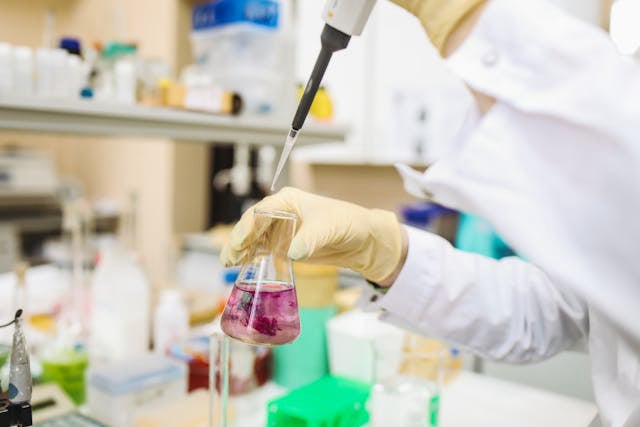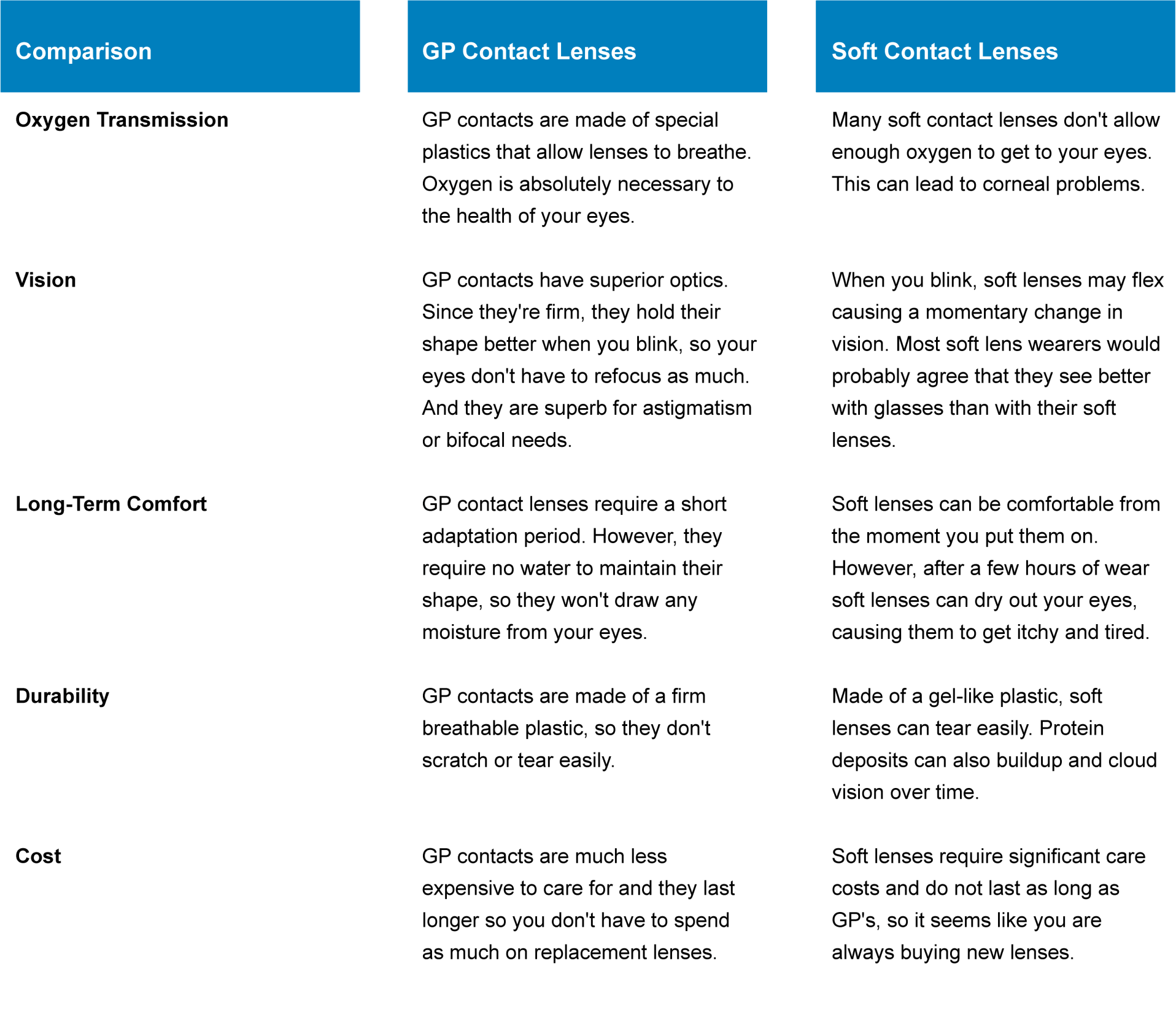
All About Gas Permeable Lenses
According to the CDC, more than 45 million Americans wear contact lenses, yet many people are still unfamiliar with Gas Permeable contact lenses.

According to the CDC, more than 45 million Americans wear contact lenses, yet many people are still unfamiliar with Gas Permeable contact lenses.
GP contact lenses, also known as rigid gas permeable’s, or RGP’s, offer crisp clear vision, easy care and handling, and excellent eye health. GP’s are made of firm, durable plastic that allows oxygen to pass through the lens.
GP’s are healthier than soft contact lenses because they don’t contain water. Water can allow bacteria to grow on the lens and even in your eye. GP lenses are easy to clean and disinfect, and can last years longer than soft lenses. The rigidity of GP contacts also makes them easier to handle than soft lenses. And since they are firm and hold their shape better, they provide crisper vision.
Don't confuse GP contacts with hard lenses. GP lenses may be firm, but they are not the old uncomfortable hard lenses of the past which have become all but obsolete. In contrast, soft contact lenses are made from gel-like plastic that contains as much as 75% water. They start out more comfortable, but as they age and get deposits they can be less comfortable than GP lenses.
GP contact lenses can be custom made or fit from precise inventory systems. Your eyecare specialist will measure the exact shape of your cornea and prescribe lenses with the curvature, size, and corrective power for your eyes.
You may not know the advantages that GP's have over soft contacts. Initial comfort is the only area where soft lenses rate better than GP contacts. Once you are used to them, GP lenses are comfortable, healthier, durable, easy to care for, cost less and provide better vision. Review the comparison chart below to see how GP's rate.

Most people can. Recent advances in contact lenses include orthokeratology lenses, astigmatism-correcting lenses, multifocals and bifocals. Whether you're nearsighted or farsighted, young or old, you can most likely wear some type of GP contact lens.
This is normal for first-time wearers, but not to worry, your eyecare professional will assist you in inserting and removing your lenses. Once you do this a few times you will no longer worry.
As soon as the need for vision correction is identified, contact lenses are a viable option. With proper care and lens maintenance, patients of all ages can wear contacts effectively.
Contact lenses are a healthy vision option for millions of people. But only your eyecare professional can determine if you are a candidate. With proper care your lenses will continue to be safe and effective. You also need to see your eyecare professional regularly to insure long-term corneal health.
Sports vision doctors agree that contact lenses are the best vision correction option for athletes. They can enhance visual skills like depth perception, peripheral awareness, and eye-hand coordination. Unlike glasses, contacts offer athletes a competitive advantage because they stay in place under dynamic conditions, provide a wider vision field, and eliminate the risk of glasses-related injuries. Orthokeratology is another way to eliminate the need to wear glasses or contacts during sports.
Many contact lens specialists agree that GP contact lenses, which are made of firm plastic, may slow the progression of myopia (nearsightedness), whereas spectacles or soft contact lenses offer no such benefit. Orthokeratology offers these patients overnight vision improvement. Better vision during the day, from sleeping in a special GP contact lens. Various eyecare practitioners are continuing research in this area.
Yes. Astigmatism is distorted vision caused by an irregularly shaped cornea. Contact lenses that correct astigmatism are called torics. Gas permeable contacts tend to work better for astigmatism, because their firm material keeps the lens from flexing when you blink. In addition, small amounts of astigmatism may be corrected with a regular, non-toric GP contact lens.
No. When they were first introduced, soft contact lenses were more comfortable than old-style hard contact lenses. But GP contact lenses are the next advancement. New, lens materials that breathe and innovative designs make them a great option for contact lens wearers, offering crisp vision, better corneal health, longer lasting lenses, and easier care than soft contacts. GP to Soft lens comparison.
GP contacts, which last for years, only require daily cleaning and disinfecting which is easily done while the lenses are not being worn. Most soft lenses require daily cleaning/disinfection and weekly enzyming and do not last as long as most GP lenses.
The cost of lenses can vary greatly. If you need correction for problems like astigmatism, or choose orthokeratology, your lenses will most likely be more expensive. GP contacts, though initially more expensive, can last for years and are inexpensive to care for. Fortunately, GP contacts can also accommodate any prescription because they are custom-made for each patient.
It depends on the type of GP lens you're wearing, your tear film, general eye health, and other factors. GP contact lenses can be slept in, but never wear them while sleeping unless your eyecare practitioner says you can.